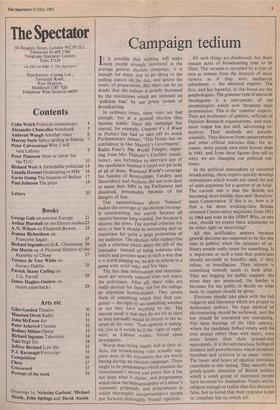Campaign tedium
It is possible that nothing will make most people strongly interested in the average general election campaign. It is enough for many just to go along to the polling station on the day, and ignore the weeks of preparation. But there can be no doubt that the tedium is greatly increased by the restrictions which are imposed on 'political bias' by our prissy system of broadcasting.
In ordinary times, these rules are bad enough, but at a general election they become manic. Since this campaign has started, for example, Channel 4's A Week in Politics has had to take off its mock Parliamentary debate, 'This House has no confidence in Her Majesty's Government'. Radio Four's The World Tonight, repor- ting from Mrs Thatcher's Finchley consti- tuency, was forbidden to interview any of the candidates because it could not get hold of all of them. Weekend World's coverage last Sunday of Birmingham, Yardley, and Shrewsbury and Atcham, did not even dare to name their MPs in the Parliament just dissolved, presumably because of the dangers of bias.
This squeamishness about 'balance' makes the coverage of the election extreme- ly uninteresting, not merely because all reports become long-winded, but because it distorts the news. The normal criterion for news is that it should be interesting and/or important for quite a large proportion of the audience. The election rules replace this with a criterion which alters the job of the journalist. Instead of being someone who selects and presents news in such a way that it is worth passing on, he acts as referee in a game with strict rules and few fans.
The fact that information and entertain- ment are severely reduced does not worry the politicians. After all, these rules are really devised for them, not for the unhap- py television licence-holder. They assure them of something which they find con- genial — the right to say something whether or not they have anything to say. The natural result is that they do not try• as hard as they normally would to attend to the in- terest of the voter. Their egotism is indulg- ed, just as it would be if the 'right of reply' were, as Labour wishes, forced upon newspapers.
Worse than being simply dull in their ef- fects, the broadcasting rules actually sup- press most of the arguments that are worth having during an election campaign. There ought to be programmes which examine the Government's record and prove that it has not done what it claims, and programmes which show the impracticability of Labour's economic proposals, and programmes in which thoroughly unrepresentative people put forward thoroughly 'biased' opinions.
All such things are disallowed, but there remain acres of broadcasting time to be filled. The vacuum is occupied by a type of men as remote from the interests of most viewers as if they were mediaeval schoolmen — the electoral experts. The first, and less harmful, of this breed are the psephologists. The grimmer type of electoral theologians is a sub-species of the psephologists which now threatens their preeminence. This is the 'opinion' experts. They are professors of politics, officials of Opinion Research organisations, and now, more vulgar but less dull, advertising ex- ecutives. Their methods are pseudo- scientific. They discover from census returns and other official statistics that, for in- stance, more people own their houses than in 1945, and from these figures they tell us whey we- are changing our political opi- nions.
In the artificial atmosphere of censored broadcasting, these experts quickly develop orthodoxies which would not stand the test of open argument for a quarter of an hour. The current one is- that the British are becoming more middle class and 'therefore' more Conservative. If this is so, how is it that a far more working-class Britain returned Conservative majorities from 1951 to 1964 and even in the 1030s? Why, in any case, should we expect these arguments to be either right or interesting?
All this artificiality matters because general elections are supposed to be the one time in politics when the opinions of or- dinary people really count for something. It is important at such a time that politicians should succumb to humility and, if they refuse, to humiliation. Their interest is something nobody needs to look after. They are begging for public support: the more they are protected, the harder it becomes for the public to decide on what basis its support should be given.
Elections should take place with the full vulgarity and fierceness which are proper to democratic politics. No legal method of electioneering should be eschewed, and the law should be restrained not restraining. The open hustings of the 18th century, where the candidate bribed voters with his own money rather than with theirs, were more honest than their present-day equivalents. It is the subconscious feeling of distance and powerlessness which produces boredom and cynicism in so many voters. The hours and hours of election television contribute to this feeling. They sanctify the goody-goody character of British politics which a small group of interested people have invented for themselves. Voters are in- telligent enough to realise that this picture is false, but so bored that their response is not to complain but to switch off.










































 Previous page
Previous page